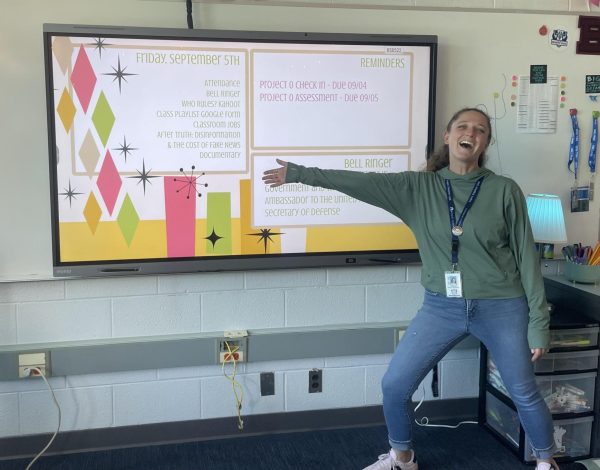2021 New Year’s Resolutions
Writing your resolutions down is a good way to hold yourself accountable.
Needless to say, most people cringe at the sheer mention of 2020. It was a year filled with confusion, frustration, and sorrow. Hundreds of millions of Americans witnessed unfathomable events: a political upheaval, a human rights revolution, a deadly pandemic, and more. While we could wallow in the dark past, it might be better to leave it behind and move on to the better times to come. That is why I think New Year’s resolutions are more important than ever this year, despite the common belief that they are pointless and cliche. I sought out to observe what people are aiming for this year, and my goal is to prove that the future is bright. 2021 has a lot in store, so let’s dive in.
High school students faced a huge adjustment in 2020: shifting from in-person to online school with no adjustment period. This made it difficult to connect with friends and experience hands-on learning. While many of us struggled with this change, having more time at home meant discovering new hobbies, interests, and habits. I reached out to multiple students in the Berkley community to see how they plan to take the lessons we learned from 2020 and use them to have a better year ahead. Here’s what I found:
Sophomore Sarah Cantor stated, “My goal going into the year ahead is to spend less time on social media, specifically Instagram because it creates a toxic and addicting environment for me.”
Junior Skylar Walter stated, “This year I decided to make my main resolution to better myself. During the first quarantine, I was staying productive and happy. I want to be in that place again, so this year, I am focusing on finding things that keep me content with my life and staying productive.”
Senior Monica McNally stated, “I want to work on myself this year in terms of my health and self-love. I also want to be more involved in charity and give back more because many people are still experiencing struggles from last year.
These are some great resolutions, and they all share a common theme. It seems as though most people are aiming for happiness, contentment, and self-improvement. After a year that tore a lot of us down, it makes sense that many people are aiming to better themselves and create goals that will help improve their happiness. This all starts with being confident in yourself and the positive habits you create.
Many people may still think that following your goals throughout the new year is too big of a commitment to stick to. I did some research on possible methods people can use to make their resolutions more realistic and sustainable. According to Harvard Health, there are some key steps you can take to make your New Year’s resolutions stick:
First of all, breaking your goals down into small, manageable steps is very important. It allows you to accomplish small feats that are easier instead of one overwhelming accomplishment. Besides, having smaller goals can motivate you to complete more in the long run. After you complete one thing, you will have the drive to move on to the next. Instead of becoming drained from a large task, breaking it down into smaller parts has many valuable benefits.
Example: If you are trying to be more active, don’t instantly start going to the gym every day. Maybe start by going two or three times a week, then work your way up to going more. It’s not about going all in at first, it’s about slowly making progress to make your way there.
Harvard Health also suggested giving yourself a figurative or literal award. Whether it’s a mental pat on the back or indulging in your favorite dessert, rewarding yourself gives you something to look forward to and makes you more likely to follow through on your goals. You can also try giving yourself small rewards at first then work your way up to bigger ones when you begin to reach bigger goals. Each incentive should be tailored to your interest and whatever it is that makes you feel good about yourself.
Example: Let’s say your resolution is to read more books. For every book you finish, you could treat yourself to your favorite dessert. Or, you could set a goal to read a certain amount of pages per day before you can go on your phone, for instance.
Finally, Harvard Health professionals suggest learning from your past. This means taking what you experienced the year before and using it to reflect whenever you face an obstacle. If you take the lessons you learned from 2020 and apply them to the year ahead, you are sure to accomplish your goals and have a happy, successful year.
Example: Maybe you let social media get the best of you in 2020. You were sitting at home and noticed yourself mindlessly scrolling through others’ pictures and comparing yourself to them. In 2021, you could adjust by reducing your social media usage to avoid feeling the same way you did last year.
Overall, it seems like peoples’ main goal this year is to better themselves. This can be as simple as adjusting your habits, or as big as committing to serve others and give back to struggling communities. The bottom line is that it’s important to invest in smart goals. Ask yourself, “What can I reach for that is sustainable, achievable, and good for my overall wellbeing?” There is no right or wrong New Year’s resolution. All that matters is that you create a goal for yourself that is fulfilling and achievable for you. Whatever it is, everyone’s unique resolution can be achieved with a little bit of optimism and hard work. No matter what 2020 threw at us, there is no doubt that 2021 can be a better year, and it’s up to us to make it that way.

Hi, my name is Brynn Middlemiss, and I am a senior here at Berkley. I am a Copy Editor for The Spectator! I just joined the journalism class at BHS this...







